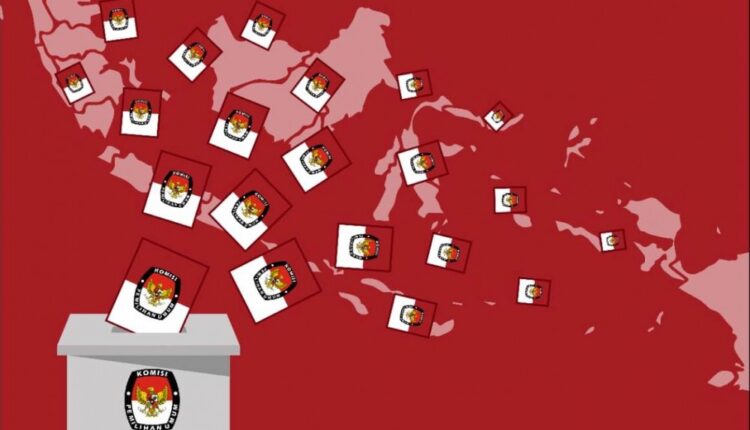The Government Continues to Anticipate Areas Prone to the 2024 Election
By: Mayang Dwi Andaru )*
The government continues to anticipate election-prone areas in Papua. Election preparations must be carried out, especially security issues. With anticipation, it is predicted that the 2024 Election will run smoothly, without any interference from KST or other separatist groups on Cendrawasih Earth. Apart from that, anticipation is also being made by reducing the noken system which is very risky.
Election is a grand event that is held every 5 years and the people are waiting for it with enthusiasm, because they want to get a new leader candidate. Since the reform era, Indonesian citizens have been free to choose their own presidential candidate. The people are happy because the names of the presidential candidates are known even though the campaign period has not yet started.
Elections are held throughout Indonesia, including in Papua. When there is the upcoming 2024 election, security on Cendrawasih Land will be carried out more stringently. The reason is to guard against attacks from KST (Separatist and Terrorist Group), OPM (Free Papua Organization), or other rebel groups. Another way to anticipate is to reduce the high-risk camshaft system.
The Papua Regional Police revealed the vulnerability mapping of the 2024 election. As a result, 12 districts were declared to be in the conflict-prone category during the implementation of the 2024 election.
Papua Police Chief Inspector General Pol. Mathius D. Fakhiri said the regencies included in the conflict-prone list include Intan Jaya, Dogiyai, Deiyai, Puncak, Nduga, Lanny Jaya, Puncak Jaya, Yahukimo, Gunung Bintang, Jayawijaya, Tolikara and Yalimo.
The Head of Regional Police explained, the 12 districts were in anticipation of the Papuan Regional Police so that the vulnerability to the previous Pilkada would not recur in the 2024 Election. He added, the use of the Noken tie system could be reduced because it was a trigger for conflicts leading to fatalities.
According to the Kapolda, it is necessary to reduce the use of the noken system, because this system is considered a trigger for conflicts that have the potential to cause casualties. In the noken system, political actors can win over the remaining votes, and this is a serious concern for public security and safety.
Inspector General Pol Mathius continued, because they won the remaining votes of these political actors, he marketed this election as one man one vote or one person one vote.
The noken system is a general election system that is used specifically for a number of districts in the Central Highlands region of Central Papua and Highlands Papua Provinces, Indonesia. This system is named after the noken, which is a woven bag made of bark fiber which has a central role in the life of the Papuan people. It is not known exactly when the noken system was first conceived.
The noken system is used in the customary areas of Mee Pago (Central Papua) and La Pago (Mountain Papua). On election day, the noken bag acts as a substitute for the ballot box. Each noken represents a candidate, and elections are carried out in public by inserting ballots into the agreed candidate’s noken, or by lining up in front of the noken.
Votes can be given to only one candidate or divided among several candidates according to a previous agreement. However, it was reported that lately the elements of deliberation and general elections using noken have disappeared from the field.
The noken system also drew criticism because it triggered a brokerage system which led to money politics; vulnerable to manipulation by political elites; sacrificing individual suffrage; and contrary to the principle of free and secret elections.
The results of the general election for the noken system are also somewhat “odd” when compared to other regions in Indonesia, considering that the turnout rate reached 100%, the number of invalid votes was completely absent, and the vote acquisition of candidates in certain areas could reach 100%. The system is even considered to exacerbate tensions.
In addition to reducing the noken system, anticipation is also being made by eradicating KST, especially in areas prone to Papua. Traditional leader Jos Magay expressed his appreciation and gratitude for the presence of joint TNI/Polri security personnel in maintaining the comfort and security of the community. Jos Magay also firmly rejected the acts of violence that were often carried out by KST in Tembagapura.
In a sense, traditional leaders and the people of Papua are both anti-KST. They reject the arrival of the separatist group in their area, especially ahead of the 2024 Election. KST is very detrimental because if they come, they will threaten the community and then commit robbery. If his request is not complied with there will be acts of violence and harm the residents, because they feel terror.
It would be a big mistake if KST claimed that its separatist movement was supported by the Papuan people. In fact they only aim for power in Papua, but do not care about the people. The proof is that the number of injured and fatalities from the people of Cendrawasih Earth is increasing.
The government continues to anticipate conflicts in conflict-prone areas in Papua, so that elections run smoothly. You do this by reducing the noken system which is not in accordance with the principles of the election. Apart from that, KST eradication continues to be carried out so that the elections can take place without problems.
)* The author is a contributor to the Main Sadawira Institute
